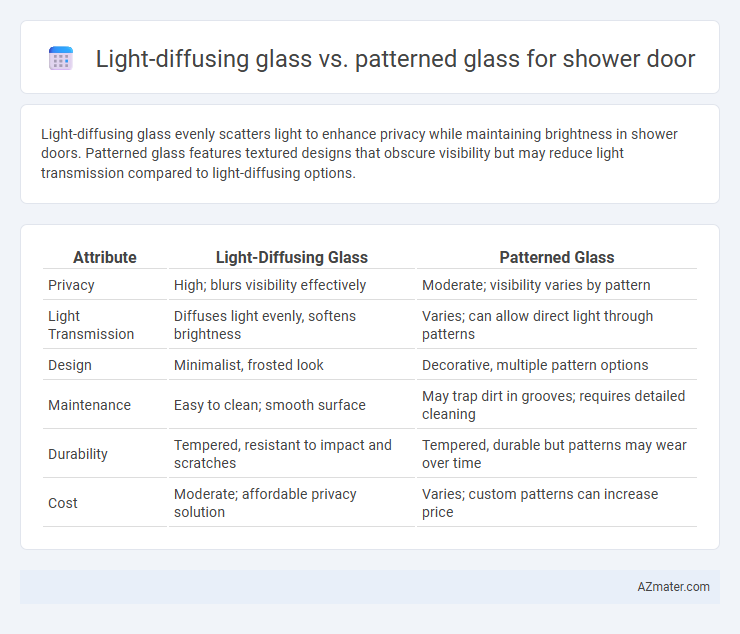Light-diffusing glass evenly scatters light to enhance privacy while maintaining brightness in shower doors. Patterned glass features textured designs that obscure visibility but may reduce light transmission compared to light-diffusing options.
Table of Comparison
| Attribute | Light-Diffusing Glass | Patterned Glass |
|---|---|---|
| Privacy | High; blurs visibility effectively | Moderate; visibility varies by pattern |
| Light Transmission | Diffuses light evenly, softens brightness | Varies; can allow direct light through patterns |
| Design | Minimalist, frosted look | Decorative, multiple pattern options |
| Maintenance | Easy to clean; smooth surface | May trap dirt in grooves; requires detailed cleaning |
| Durability | Tempered, resistant to impact and scratches | Tempered, durable but patterns may wear over time |
| Cost | Moderate; affordable privacy solution | Varies; custom patterns can increase price |
Introduction to Glass Options for Shower Doors
Light-diffusing glass for shower doors offers a soft, frosted appearance that enhances privacy while allowing natural light to permeate, creating a bright and airy bathroom atmosphere. Patterned glass features etched or embossed designs that provide decorative appeal and obscured views, balancing style with functionality. Both options improve privacy but differ in texture and light diffusion, catering to various aesthetic preferences and bathroom designs.
What is Light-Diffusing Glass?
Light-diffusing glass is engineered to scatter light evenly, minimizing glare while enhancing privacy in shower doors. Unlike patterned glass, which features raised textures or designs to obscure visibility, light-diffusing glass provides a smooth surface that softens and disperses incoming light. This technology improves ambient lighting in bathrooms while maintaining a sleek, modern aesthetic and ensuring a high level of obscurity.
Understanding Patterned Glass
Patterned glass for shower doors features embossed or etched surface designs that obscure visibility while allowing light to pass through, enhancing privacy without sacrificing brightness. Unlike light-diffusing glass, which disperses light uniformly to reduce glare, patterned glass creates decorative textures that can complement bathroom aesthetics. The variety of patterns available provides both functional privacy and customizable style options, making patterned glass a popular choice for contemporary shower enclosures.
Visual Privacy: Light-Diffusing vs Patterned Glass
Light-diffusing glass provides enhanced visual privacy by scattering incoming light to blur shapes and movements while maintaining brightness in the shower area. Patterned glass uses textured designs like frosted waves or geometric motifs to obstruct clear views, offering moderate privacy with a decorative touch. Choosing between them depends on the balance desired between maximal privacy and aesthetic style in bathroom design.
Aesthetic Appeal and Design Versatility
Light-diffusing glass creates a soft, frosted effect that enhances privacy while allowing natural light to pass through, making it ideal for minimalist and modern bathroom designs. Patterned glass offers a wide variety of textures and motifs, enabling customized aesthetic appeal that can range from classic to contemporary styles. Both options provide design versatility, but patterned glass often serves as a decorative focal point, while light-diffusing glass emphasizes subtle elegance and brightness.
Light Transmission and Bathroom Brightness
Light-diffusing glass transmits a higher percentage of natural light, typically around 70-80%, enhancing overall bathroom brightness while maintaining privacy by scattering light evenly. Patterned glass transmits less light, often between 50-65%, due to its textured surface that creates visual obstruction and reduces glare but allows less illumination. Choosing light-diffusing glass maximizes daylight penetration, improving the shower area's openness and ambiance compared to patterned glass.
Maintenance and Cleaning Considerations
Light-diffusing glass for shower doors minimizes visible water spots and fingerprints, making it easier to maintain with regular wiping and standard glass cleaners. Patterned glass tends to trap soap scum and mineral deposits in its textured surface, requiring more frequent scrubbing and specialized cleaning tools to prevent buildup. Choosing light-diffusing glass reduces overall maintenance time and effort compared to patterned glass in high-moisture environments.
Durability and Safety Factors
Light-diffusing glass for shower doors offers superior durability due to its tempered construction, resisting impacts and thermal stress better than patterned glass. Patterned glass, often textured or embossed, provides excellent slip resistance but may be more prone to surface wear and chipping over time. Both options enhance safety with shatter-resistant properties, yet light-diffusing glass typically meets higher safety standards for impact resistance in wet environments.
Cost Comparison: Light-Diffusing vs Patterned Glass
Light-diffusing glass typically costs more than patterned glass due to advanced manufacturing techniques that enhance privacy and light transmission. Patterned glass offers a cost-effective solution with various textured designs that obscure vision while maintaining affordability. Homeowners seeking a balance between aesthetics and budget often prefer patterned glass for shower doors over the higher-priced light-diffusing options.
Choosing the Right Glass for Your Shower Door
Light-diffusing glass offers a frosted appearance that enhances privacy while softly scattering light, creating a bright yet concealed shower space. Patterned glass features textured designs that not only obscure visibility but also add a decorative element, making it ideal for those seeking both style and functionality. Selecting the right glass depends on your preference for privacy level, light transmission, and bathroom aesthetics to ensure your shower door complements the overall design.

Infographic: Light-diffusing glass vs Patterned glass for Shower door
 azmater.com
azmater.com